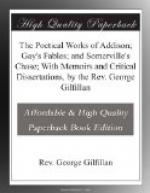3
The merchant, robb’d of pleasure,
Sees tempests in despair:
But what’s the loss of treasure,
To losing of my dear?
Should you some coast be laid on,
Where gold and diamonds grow,
You’d find a richer maiden,
But none that loves you so.
4
How can they say that nature
Has nothing made in vain;
Why then beneath the water
Should hideous rocks remain?
No eyes the rocks discover,
That lurk beneath the deep,
To wreck the wandering lover,
And leave the maid to weep.
5
All melancholy lying,
Thus wail’d she for
her dear;
Repaid each blast with sighing,
Each billow with a tear;
When o’er the white wave stooping,
His floating corpse she spied;
Then, like a lily drooping,
She bow’d her head,
and died.
END OF GAY’S SONGS.
Footnotes:
[Footnote 1: Second son of George II.; born in 1721; he was five years old at the date of the publication of the ‘Fables,’ which were written for his instruction. He is ‘Culloden’ Cumberland.]
[Footnote 2: ‘Siam,’ a country famous for elephants.]
[Footnote 3: ‘Gresham Hall,’ originally the house of Sir Thomas Gresham in Winchester. It was converted by his will into a college, no remains of which now exist.]
[Footnote 4: ‘Curl,’ a famous publisher to Grub Street.]
[Footnote 5: Garth’s Dispensary.]
[Footnote 6: ‘Porta:’ a native of Naples, famous for skill in the occult sciences. He wrote a book on Physiognomy, seeking to trace in the human face resemblances to animals, and to infer similar correspondences in mind.]
[Footnote 7: ’——When
impious men bear sway,
The
post of honour is a private station.’-ADDISON.]
[Footnote 8: ‘Antiochus’: See Plutarch.]
[Footnote 9: Barrow.]
[Footnote 10: ‘The Macedonian:’ Alexander the Great.]
[Footnote 11: ‘Corelli:’ Arcangelo, the greatest fiddler, till Paganini, that has appeared. He was born in the territory of Bologna, in 1653, and died in 1713.]
[Footnote 12: ‘Antoninus:’ Marcus, one of the few emperors who have been also philosophers.]
THE
LIFE OF WILLIAM SOMERVILLE.
* * * * *
There is a chapter in an old history of Iceland which has often moved merriment. The title of it is, “Concerning Snakes in Iceland,” and the contents are, “Snakes in Iceland there are none.” We suspect, when our “Life of William Somerville” is ended, not a few will find in it a parallel for that comprehensive chapter, although we strenuously maintain that the fault of an insipid and uninteresting life is not always to be charged on the biographer.




